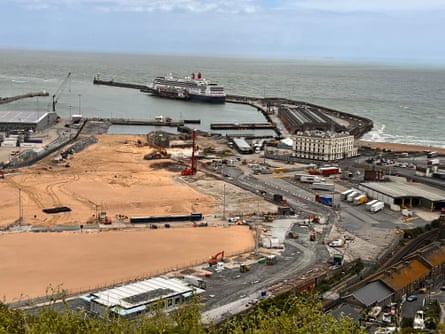British citizens who travel frequently to the EU face having their fingerprints individually checked each time they cross the border into the Schengen area because of delays in developing an app to verify biometrics digitally, it has emerged.
It will be “business as usual” this summer but “a big change” in travel will be phased in from November, Doug Bannister, the chief executive of the Port of Dover has said.
“Significant infrastructure” including reclaiming 13 hectares of land in the Port of Dover to handle passengers getting out of cars and buses has been put in place to try to minimise disruption, Bannister said.
Under the system being built, all car passengers will have to get out of their vehicle to be individually fingerprinted and photographed.
On every subsequent journey, a fingerprint or a facial image will be verified along with passport number, in a major shift designed to get rid of “wet stamping” and allow the number of days British visitors stay in the EU in any given year to be automatically recorded.
It is envisaged that an app that can be installed on a border force tablet can be passed into the car for verification of each individual’s biometrics.
Frontex, the European border agency, has developed the app, but confirmed it was up to each member state to implement its use.
“We have been told that any app won’t be ready any time before November, but hopefully it could come swiftly after that,” said Bannister.
“[It means] second, third, fourth time travellers still need to have a biometric captured at the border,” he said, meaning passengers will still have to get out of their vehicle for border checks until the app is ready.
The ort prides itself on the speed with which it operates. Bannister says it can load and off-load a ferry “with 120 trucks, 1,000 passengers and a couple of hundred cars in 45 minutes, faster than an A320 at Gatwick”.
He is confident the biometric check regime being built will add just six minutes to a car journey.
The new regime has presented particular challenges in Dover because the port is hemmed by the cliffs and there is no safe space for car passengers to be checked amid the flow of 10,000 trucks a day crossing the channel.
“In an airport you have a nice, air-conditioned, well-lit hall, and an orderly queue of foot passengers going through. But we needed to cater for a carload of four people on a large, stormy night. So we couldn’t have people exit their vehicles [in the ferry queues]. That would be dangerous.”

In an extraordinary solution supported by the UK and French governments, Dover will create a virtual frontier system, 1.4 miles across town for border checks on 12 hectares of reclaimed land.
Peering down from the western cliffs, the first building to cater for coaches is already in place on a vast swathe of built-up ground currently topped with golden sand.
A second bus and a separate car building will be installed in the coming months.
To ensure the integrity of the border, buses will have their doors physically sealed with tape while they rejoin regular traffic across Dover town and continue a 1.4-mile journey from the western ferry to board the ferry at the eastern docks.
Irregular movements between the biometric border and the ferry board will be monitored by a combination of AI and automatic number plate recognition.
It isn’t the only change Bannister is expecting in the coming months.
He is also hopeful that the reset in the relationship between the UK and the EU will end the environmentally and economically damaging issue of trucks returning to the continent empty.
Another byproduct of Brexit, it is estimated that on some days 30% to 40% of trucks have no cargo on them when they return to the continent because of strict checks on fresh food and farm products. These are expected to be scrapped as part of Keir Starmer’s reset.
With £144bn worth of goods traded over the channel every year, the Port of Dover is of critical economic interest to France and the UK, representing half of the total of UK goods exported to Europe, Bannister said.
The EU and the UK have pledged to negotiate a new deal eliminating the checks on food, which will allow small food and farm producers to export to Europe once again.

 3 months ago
166
3 months ago
166

















































